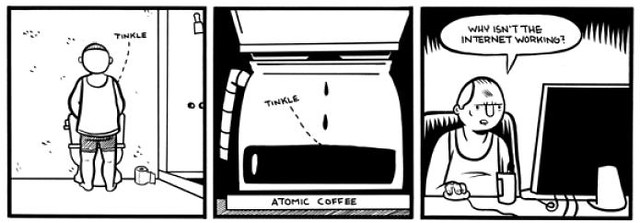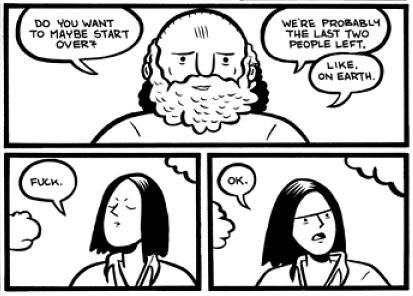Who is Box Brown, and what is his new graphic novel, The Survivalist? Get a short sketch on these subjects on our parent blog Trouble With Comics, and then come back here and see what the Flashmob Fridays gang thought of Brown's newest work, from Blank Slate books.
 Roger Green:
Roger Green:One of the curses of being out of the comic scene is that I had no idea who/what a Box Brown was. Turns out he's a well-regarded, interesting-seeming guy who's drawn more than a few books in recent years, in a stylized manner that reminds me of some underground artists of the past.
I was gearing up to read The Survivalist, a TMI recap which is out there on the Internet. This was a triptych of a book thematically. The first part is the guy in the cubicle who listens to right-wing radio and hates Big Pharma. He's believable, to be sure -- I have relatives... But he's not all that pleasant to be around. His co-workers are banal and not all that interesting. He straddles the line between character and caricature. All of this, I suppose was the artist's intent, and in that fashion, he succeeds.
The second part is essentially a monologue, which made me impatient, and worse, bored. It could be interesting can one be sitting alone drawing comic books that, perhaps, no one will ever see, but this just annoyed me, maybe because I hadn't invested in him.
The third part, though, is primarily a one-on-one dealing with a woman. This section interested me the most by far, though her fate is foretold early on. By the end, at least, I was interested to see what the protagonist would do in this changed world. So I guess I didn't like reading it very much, yet was engaged enough by the end with the changes in the main character to want to see him again. Odd, I reckon.

Alan David Doane:
You may have noticed there are a lot of crazy people in the world today, perhaps more than at any time in history. The confluence of worldwide financial disruptions and unprecedented access to instantaneous global communication has resulted in our anxieties and fears being instantly transmitted across the world to anyone willing to read, watch or listen to them. The end result has been a self-reinforcing feedback loop comprised of legitimate outrage and lunatic hysteria in seemingly equal measure.
Noah W. is the title character in cartoonist Box Brown's new comic The Survivalist; his parents built a bomb shelter in the 1950s that circumstance forces him to he live in. He spends his free time working on comics no one will ever read and smoking pot, while listening to right-wing hate-radio broadcaster Dick March (great name!) and raging against the oppressive influence of "Big Pharma" on the people.
One day a meteor strike changes Noah's world, at once wiping out everything he knew, yet justifying his crazy life in the bunker, surrounded by survival packs of 50-year barbecue-flavour potato chips. When things have stabilized enough in the surface world for him to venture outside, he meets Fatima, seemingly the last woman on Earth, and we get to the meat of the story, Noah's dialogues with Fatima about life, the universe and everything.
The Survivalist isn't a paradigm-shifting graphic novel that will be trumpeted on NPR or in the New York Times Review of Books. It's a pretty straightforward and unassuming set of well-cartooned observations about human nature, actually, with Box Brown having a great deal of fun with his characters and with some Chris Ware-style diagrams (and in at least one panel, Ivan Brunetti-style romantic reductionism). Best of all, Brown doesn't judge his lead character too severely, but rather lets him state his beliefs and then see how they respond and evolve when they intersect with events in the real world, which operates at a scale in which we humans barely have a say at all. This technique may prove to be overwhelmingly prescient and applicable to us all in the very near future, making The Survivalist not only a fun read but one that speaks to our universal experience as human beings facing increasingly troubled and troubling times.
Christopher Allen:
I’m not familiar with Box Brown’s work, so based only on this, I call him a promising cartoonist who doesn’t quite put it all together to make a satisfying book. The cover is intended to resemble some type of end-of-days instruction book, and it’s effective at that, but also a hint at what I find to be the shortcoming of the book. More on that later. The story finds an annoyingly negative office nerd—the kind of guy who ruins your breakroom lunch because he can’t resist telling you about the chemicals in it—whose apocalyptic worldview is proven correct by some vague attack that leaves rubble and death for as far as he can see. Lucky for him, he was in his bomb shelter.
 The funniest part of the book, and the part I sense was closest to the author’s life, is how this unexpected disaster affords our hero the time to finally do what he wants to do, which is to work on his comics. He’s got plenty of food stored away, so he hunkers down and finishes off that graphic novel he’s been wanting to do. I suspect that some of us in the same situation would do something like this, maybe play videogames all day long, rather than head out to reestablish society. The black-and-white artwork is well-suited to a story that seems to strive for poignance but mostly settles for dark humor.
The funniest part of the book, and the part I sense was closest to the author’s life, is how this unexpected disaster affords our hero the time to finally do what he wants to do, which is to work on his comics. He’s got plenty of food stored away, so he hunkers down and finishes off that graphic novel he’s been wanting to do. I suspect that some of us in the same situation would do something like this, maybe play videogames all day long, rather than head out to reestablish society. The black-and-white artwork is well-suited to a story that seems to strive for poignance but mostly settles for dark humor.What I found most disappointing is the lack of change in the main character. True, there are successful stories about characters faced with something that should have a profound impact on their life and yet they remain essentially the same person afterwards: Daniel Clowes’ The Death Ray is a good example of this. But with both the apocalypse and the interactions with the irradiated woman he visits, who eventually dies, Brown doesn’t show us that either event has really changed the main character one way or another. He doesn’t grow from having to fend for himself or spending time with someone he probably wouldn’t have if the rest of humanity wasn’t annihilated, nor does he seem to suffer much in the way of loss from her passing. The lack of attention to what felt to me like essential elements to give the story meaning, left me disappointed, though the craft and interesting premise of the story were enough to at least leave me interested in seeing what Brown does next.
Joseph Gualtieri
When Doane delivered this week’s assignment, I was pleasantly surprised by it, as I had never previously heard of Box Brown. Going into this with absolutely no preconceptions about the work was going to make for a fun and novel experience.
The artwork is probably the least impressive element of the book, but it’s not bad by any means. Brown’s style is very much of the Seth/Chester Brown/Joe Matt Torontoist school (not that they look alike, but there’s a similarity in terms of figure work between them, particularly the latter two), but it’s not as polished as the work of those big names. Brown’s style does differ from them a bit, as there’s one page showing protagonist Noah Wartowsky’s home and underground bunker that’s almost Wareian (as are the covers).
The most memorable sequence in the book comes on pages 9-12. Wartowsky heads to bed wondering about the visibility of a comet headed towards Earth that some in the “lamestream media” think will cause massive amounts of destruction. Brown cuts to a long panel, again showing the house and bomb shelter, with a tiny meteor apparently heading for the house in what looks like the world’s funniest parody of the ending to David Mazzucchelli’s Asterios Polyp. Brown cuts again though and we can see that the comet isn’t heading for Wartowsky’s home, but for a nearby city. Upon waking up, Brown wonderfully captures the banality of Wartowsky’s routine, with it slowly dawning on him just what the meteor hitting means.
Those pages are the high point for Brown blending words and pictures in the book, but the story is consistently good from one cover flap to the next. Wartowsky is a rabid listener of a Rush Limbaugh-like figure, spurred in that direction by the deaths of his parents years ago. At 36, Wartowsky is alone, trapped in his bitterness which is reinforced by the talk radio he listens to. After the meteor hits, Wartowsky comes across another survivor, Fatima. Now the basic as of the plot are utterly cliché, both in terms of what happens to Fatima and her effect on Wartowsky, it’s the way Brown hits those plot points that makes the comic work. I do not want to give anything away, but if the Survivalist is ever adapted into a film, their relationship will in all likelihood be altered into something far more conventional. The very end of the comic in particular stands out; as it addresses a problem I had with the comic to that point and does so in a way that clearly makes the earlier issue into a feature of the story, as it ties into Wartowsky’s mental state prior to meeting Fatima.
The Survivalist is not going to be the best comic you read in 2011, or possibly even December, but it’s quite good and well worth reading. Brown’s completely new to me, but after reading the Survivalist, I definitely want to see more work from him.
Johnny Bacardi
 I'm not sure who or what Mr. Brown is weighing in on exactly with his end-of-civilization fable THE SURVIVALIST; Conspiracy theory nuts? People who buy the "wisdom" crackpot radio show hosts impart? Nerdy antisocial cartoonists? Socially awkward potheads? People who routinely ignore warnings of a globe-threatening nature? None of the above? All of the above? What was the question again? Anyway...even though it resolutely sits on the fence of objectivity and paints all its characters (well, except radio host Dave March) with a pretty even-handed brush, I still found myself fascinated by how this tale unfolded until the kinda bitter end, and that's not an easy thing to do...so kudos to Mr. Brown, whose dry Seth-meets-Charles Burns style did a good job keeping me interested. This was my first look into the "Box," and while this didn't display a whole lot of outside-the-box thinking, ha ha, I think I'll be checking out some more when I get the chance.
I'm not sure who or what Mr. Brown is weighing in on exactly with his end-of-civilization fable THE SURVIVALIST; Conspiracy theory nuts? People who buy the "wisdom" crackpot radio show hosts impart? Nerdy antisocial cartoonists? Socially awkward potheads? People who routinely ignore warnings of a globe-threatening nature? None of the above? All of the above? What was the question again? Anyway...even though it resolutely sits on the fence of objectivity and paints all its characters (well, except radio host Dave March) with a pretty even-handed brush, I still found myself fascinated by how this tale unfolded until the kinda bitter end, and that's not an easy thing to do...so kudos to Mr. Brown, whose dry Seth-meets-Charles Burns style did a good job keeping me interested. This was my first look into the "Box," and while this didn't display a whole lot of outside-the-box thinking, ha ha, I think I'll be checking out some more when I get the chance.Buy The Survivalist from Amazon.com.



No comments:
Post a Comment